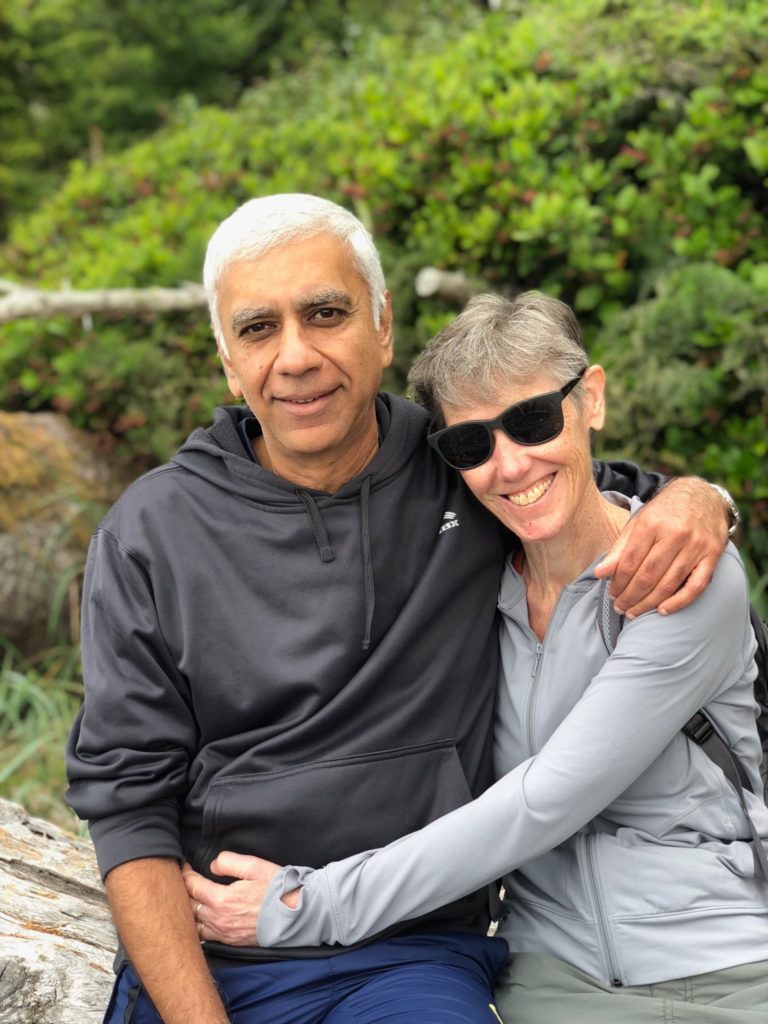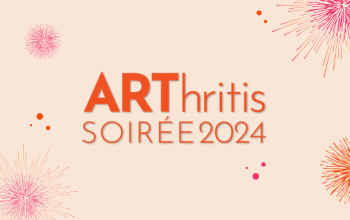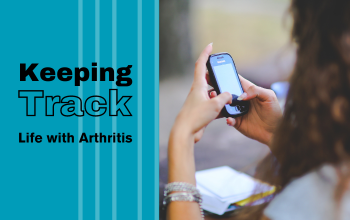Arthritis in the Family: Navigating a Loved One’s Diagnosis
An inflammatory arthritis diagnosis doesn’t just impact the patient. Typically, we tell the story of the individual living with the disease, forgetting or not recognizing that their loved ones experience a different type of pain – feelings of helplessness and searching for a new place in the patient’s life.
Phalgun Joshi knows the experience well. Both his wife and daughter live with rheumatoid arthritis (RA). In the beginning, he struggled to understand the disease, to know how to help and to accept that he could never take the pain away. Now, reflecting on those years, Phalgun believes patience is key. To his surprise, RA has brought him and his wife even closer together.
Can you tell me about your relationship with RA?

Phalgun Joshi and his wife, Alison Hoens
My wife, Alison, had been experiencing worsening joint pain for quite a while before her RA diagnosis. She had experienced a few sports injuries over the time that we had been together (over 20 years) so I thought the pain was related to these injuries. However, when it got worse, she saw a rheumatologist and I remember her coming home to share that she been diagnosed with RA. I knew that RA was an autoimmune disease and had studied the science behind it in university, but I had a poor understanding of what it would be like for someone living with it. I didn’t know what impact it would have on her day-to-day life nor was I sure of the prognosis or kinds of treatment that she would receive.
During the time just before, and right after the diagnosis, I noticed that Alison, because of the fatigue and pain, was unable to do things for the family that she previously enjoyed. For example, Alison loved working in the garden but was sad that that she was unable to now mow the lawn with our hand-mower. I also noticed that she was having difficulty with tasks such as chopping vegetables and standing over the stove to cook. It was clear that I needed to take on these tasks, and this was difficult for her to accept.
We were also unable to do outdoor activities together that we had previously enjoyed. The fatigue and pain meant that we couldn’t go on long walks or drives together. Alison is a fiercely independent individual and it was hard for me to see her needing more help from my daughters and myself. It became common for me to come home from work and see Alison sitting on the kitchen counter soaking her feet in cold water in the sink to help her ease the pain in her feet.
I also noticed that she always looked like she was in pain. She never complained, but her face showed it.
The whole business around the different drugs she was taking and their side effects was surprising to me. I began to understand that arthritis is a complicated disease…you don’t just go to a doctor, have a single drug prescribed and get better quickly. Alison had to take many different types of drugs and it appeared that there was a lot of trial and error in which treatments she received. Although many people can take the medications without side effects, this was not, and still isn’t, the case for Alison.
Did you know anyone else who had RA before Alison was diagnosed?
I had a roommate when I was in university who I knew had RA and who dealt with her pain very privately. Whenever she was in pain, she would go into her room and I wouldn’t see her for days after. But even then, I didn’t understand the impact of the disease on her. It’s only now that I realize how RA is such an unpredictable, full-body disease and I can appreciate what my roommate was dealing with.
Also, a couple of years before Alison was diagnosed, one of my colleagues found out she had RA. She told me she was in constant pain and had to stop doing things she enjoyed like running and hiking and actually had to take some time off work after her diagnosis to take care of herself. However, a few years later, she was back to working full-time and told me that the disease was under control and that she had even gone back to running and hiking again. I thought this was the norm…that people were diagnosed with RA, received treatment and got better and went back to living their pre-RA lives.
Fortunately, for many people, this is the case. But Alison’s disease seemed to be more complicated. After almost seven years of living with RA and trialing various treatment regimes, although she is overall much better, Alison still experiences fatigue, flare-ups and drug side effects.
Can you tell me how you felt when your daughter was diagnosed with RA?
When Maya was diagnosed, it was heartbreaking. With Alison’s disease, I felt that I understood what living with RA meant, and, because of this, it was just so heartbreaking to see someone so young diagnosed with this disease. I didn’t want her to also have to live with symptoms and deal with the side effects of the drugs that I had seen with Alison. Maya was 17 at the time of her diagnosis and I knew that RA would put limitations on her. For example, she loved the outdoors and playing sports and she was unable to continue to do these things. But even though I was heartbroken, I knew Maya was in good hands with her rheumatologist and having her mother share her experiences with her. I felt comforted knowing she had that extra support.
What were some of the biggest challenges you experienced?
The biggest challenge was not knowing how I could help Alison with her disease or help her get better. I have realized that mentally dealing with RA is just as important as taking the drugs. I found that I was limited in how I could help in both areas. I could do chores around the house, but I often didn’t know the right things to say to Alison in our conversations that would help her cope with the disease. I realized that I couldn’t offer her advice on how to deal with the disease in her day-to-day life and relationships. I felt that I couldn’t be Alison’s counsellor. Fortunately, she was eventually surrounded by a wonderful community of people with autoimmune diseases and a counsellor that she really liked. Her interactions with the folks on the Arthritis Patient Advisory Board at Arthritis Research Canada have been really important for her. Alison also values her relationships with the researchers and is grateful to be involved in research. It is wonderful that she is exposed to the best knowledge in clinical care and research. Her care at the Mary Pack Arthritis Centre is outstanding. She had the right supports from her friends, colleagues and medical team. I realized that I just had to be her husband – and nothing more.
What kind of tips might you give to others dealing with an arthritis diagnosis in the family?
The first tip is to be patient, very patient, with the loved one living with the disease. As a spouse or significant other, you will see the disease manifest itself in unexpected ways and at unexpected times. Flare-ups, fatigue and the drug side effects can be unpredictable. You can plan some activities, but be ready to cancel or change them with little notice. Being patient, flexible and understanding are very important. However, you also need to be patient with yourself. It takes time and energy to learn how to ‘dance’ with this disease. You will not have all the answers. You should not expect that you will do the right thing or say the right thing to make life easier for both of you. Expectations between you and your loved ones have to be realistic. You can’t be everything to your loved one but you can focus on providing a safe environment for the person to feel comfortable.
The second tip is to communicate openly with the loved one about when and what help they need. You don’t have to step in and do everything for the other person. Respect the need for your loved one to be independent and to continue to be in control of what they can and cannot do. What they may have needed help with at one point may be something that they may be able to, and want to, do independently at another time. My asking Alison when she needs help and following up accordingly helps us both.
Did you ever personally seek help after Alison was diagnosed?
There was a period when Alison and I were looking after elderly parents on both sides of the family. There were frequent medical appointments, hospital admissions and the day-to-day, home-related issues such as grocery shopping, arranging for appliance repairs/replacements, bill payments etc. that needed to be taken care of for them. These responsibilities were on top of the regular work related obligations and stresses that we had. So, dealing with all these issues as well as RA with both Maya and Alison was, at times, overwhelming.
I began to see a counsellor to help me cope with these demands and challenges and I have to admit that I found the experience to be very useful. The counsellor was really effective in getting me to put things into perspective and helped me realize the need to take care of myself physically and mentally. I learned a number of strategies to help me cope, which I still use today. I would encourage people not to hesitate to seek counselling if they themselves need help supporting a loved one with RA. No matter how confident and rational you think you are, arthritis is such a complicated condition that the unpredictability and complexity of the symptoms will be humbling in figuring out the right way to provide support that is meaningful and sustainable.
Did you experience any challenges with friends and family understanding what was happening after Alison’s diagnosis?
Both Alison and my immediate families now understand and appreciate the challenges that Alison and Maya face on a daily basis. In the beginning, it was difficult with friends. We often wouldn’t show up for functions such as parties or had to cancel at the last minute if Alison had fatigue or pain. Or, we would go to a function or event and have to leave early if Alison began to feel unwell. In the beginning, we could sense that not everyone understood why we were “unreliable guests” but over time, they have all become more understanding as we have been able to share Alison’s challenges with them. It’s all about understanding – just let them know how things are and they will get it.
There is also confusion between osteoarthritis and rheumatoid arthritis unless someone knows the difference. We often tell people that Alison and Maya have rheumatoid arthritis and they often say something like, “Oh, my grandmother has osteoarthritis but she takes Tylenol and she feels better.” Not everyone has to or will understand. I have learned that just as it is important to be patient with your loved one and yourself, you have to be patient with family and friends as well who may not understand the disease and the complexity of the symptoms.
Is there anything you would like people to understand about arthritis?

Maya (right) and her older sister Tarra (left). Maya was diagnosed with rheumatoid arthritis at 17.
First, RA is a heterogeneous disease – different people are affected in different ways. It is unfortunate that personalized treatment is not available yet. There seems to be a lot of trial and error involved in the treatment of the disease. This is not a criticism of the physicians, as we have great rheumatologists here in BC and across Canada. I just don’t think there is enough evidence available linking an individual’s genetic makeup or environmental factors with the disease. It’s difficult to predict the path of the disease at the time of diagnosis and to be confident in what treatment would be most effective.
Second, because of the heterogeneity of the disease and individual circumstances, support for different people living with RA will mean different things. The support that Maya needs from me as her father is different than what Alison needs from me as her spouse. Maya continues to get a lot of help from Alison as someone experienced with RA and based on a (typical?) mother-daughter relationship with more candid conversations possible between them. My support to Maya as her father is often limited to helping drive her to work, school or social functions or sometimes just helping her clean her room, which seems to work very well for all of us.
Third, the support for a person living with RA is a team effort. The clinical team (family doctor, rheumatologist, physiotherapist, occupational therapist, pharmacist, and counsellor), family, co-workers, and employers all play a role in supporting the individual. With Alison, she has an amazing support system of friends too. They provide her with an outlet – a support that the family and clinical team can’t provide her. It’s truly a holistic approach. There is no set of rules for how best to care for the whole person who is living with RA.
Is there anything else you would like to add?
Something that can be easily overlooked is the challenge of comfort during touch. For example, a simple gesture like holding hands when walking can be affected. Sometimes I reach out to hold Alison’s hand and she tells me that her wrists hurt too much to hold hands or when I go to hug her, she tells me that her shoulders hurt. On the other hand, lately her balance has been affected, so she has to hold on to me whenever we are walking together. We have therefore both needed to be patient with each other when it has come to physical contact.
Despite all the challenges, I believe that arthritis may have brought Alison and I even closer together. In any relationship, there are always sources of conflict that result in irritation, arguments or angst. But this disease has put everything into perspective – some of those things that make us irritated, angry or frustrated with each other are just not worth getting worked up about. Alison’s RA helps us to look at the bigger picture, our combined physical and mental health and being there for each other for support. Although there is still more work to be done, I think that we are both more forgiving, understanding and patient with each other. Our relationship is definitely stronger than it was before her RA.
The biggest surprise has been that Alison’s RA has made me personally more introspective and possibly a better person. It has brought out this nurturing part of me that I didn’t know I had. It has forced me to put things into perspective when faced with stressful or challenging situations and to be grateful for what I have in my life. Finally, it has given me the chance to learn skills to take care of myself, emotionally and physically, so that I can be a better support for Alison and Maya, and have a more positive and healthier outlook on life.





















































